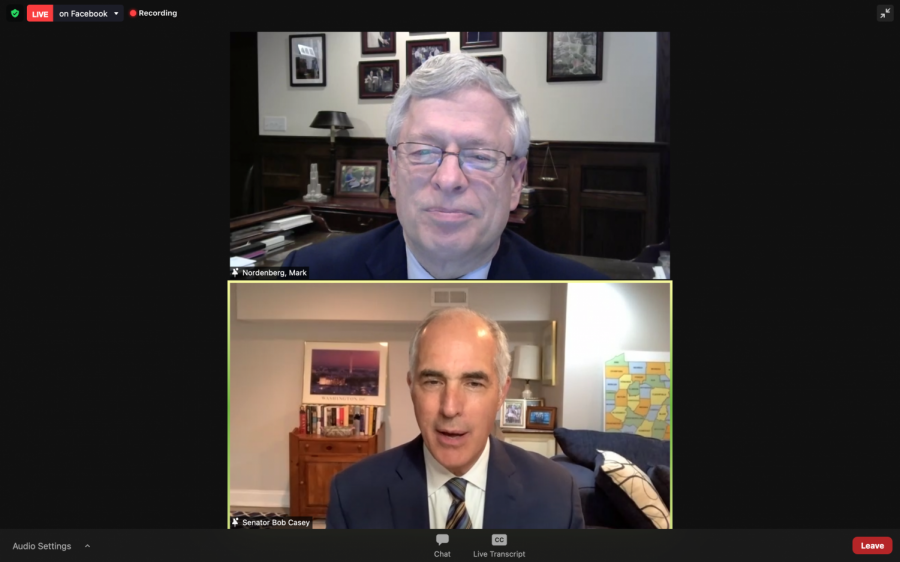‘We must do better’: Sen. Bob Casey talks disability policy and COVID-19
Sen. Bob Casey gave a virtual lecture Monday titled “Disability Policy: Beyond the Pandemic” about the effects of COVID-19 on the disabled community, monitored by Chancellor Emeritus Mark Nordenberg.
September 14, 2021
For David Thornburgh, son of former Pennsylvania governor Dick Thornburgh, the issue of disability policy is extremely close to home — his brother, Peter, was injured in a car accident as an infant that left him disabled.
Thornburgh said government officials and other public servants often take from their own experiences to form their own “political agenda,” much like his father did.
“That is a demonstration of something I think we often forget about public servants, which is the role that their own experience and their own empathy plays in shaping their agenda and providing a true north star for their policies,” Thornbugh, the president and CEO of the Committee of Seventy, said.
Another public servant who fights to improve disability policy is Sen. Bob Casey, D-Pa., who gave a virtual lecture Monday about the effects of COVID-19 on the disabled community, titled “Disability Policy: Beyond the Pandemic.” The Dick Thornburgh Forum for Law & Public Policy, within Pitt’s Institute of Politics, sponsored the lecture. Mark Nordenberg, chancellor emeritus and chair of the Institute of Politics, moderated the event.
In his opening statement, Casey said “everyone” has experience with disabilities, whether it be personal experience or that of a loved one. He said it is a “natural part of the human experience.”
“Every one of us in one way or another, will have an experience with disability at some point in our lives, whether it’s an aging parent, or whether it’s a child born with a disability, a soldier returning from combat,” Casey said. “So many thousands have a colleague who might have a disability, a neighbor who becomes ill, or the experience each of us has personally … People at some point will have a disability of one kind or another.”
Casey also said despite everyone’s experiences with disabilities, disability policy is “often ignored” in politics. He said he is trying to change that, and the government “hasn’t focused enough” on disability policy.
“Over the last couple decades — the Americans with Disabilities Act being one of the great exceptions — too often, disability policy in Washington, D.C. has been ignored,” Casey said. “And we’re trying to change that over the past couple of years, despite good work being done by a number of members of congress in both parties in both houses over time.”
Casey also said people with developmental and intellectual disabilities, such as cerebral palsy or Down syndrome, are the second highest group most likely to die from COVID-19. He said those with disabilities were more likely to become infected in “congregate” settings and this caused the need for home-based services to increase. And because of Medicaid rules, according to Casey, it is difficult to get home-based services to those who need it. Other services, such as nursing homes, are required by law to have no “waiting period” or “cap” on their services.
“This is not the case, unfortunately, for home-based services,” Casey said. “Home- and community-based services are provided by a waiver — essentially an exemption to the law. Most waivers have limits on two things: the number of people served, and even the categories of people who can be served.”
To combat this issue, Casey proposed a bill to provide care to people with disabilities who are on waitlists for home-based services. He said the bill will also increase wages for care workers, who make an average of $12 per hour across the country. He called this bill “essential.”
“I proposed a ‘better care, better jobs’ bill that will both expand home- and community-based services and improve compensation wages for the workforce who provide these essential, even heroic, services,” Casey said. “It will provide a few hundred billion dollars to meet these dual goals of more services and better pay for the workers.”
Casey added that people with disabilities need to be included when making new “procedures, policies or processes for emergencies or disasters.” He said people with disabilities should have leadership roles at all levels of the United States government.
“And by saying ‘included,’ I mean actually included. Not as tokens or not as committee participants,” Casey said. “We need to include people with disabilities throughout all of our systems. They need to be leaders, and to be given the opportunity to be leaders in state, local and federal agencies.
Casey said the COVID-19 pandemic revealed how flawed the current care system for people with disabilities is, and “we must do better.”
“We can and must do better for people with disabilities,” Casey said.



